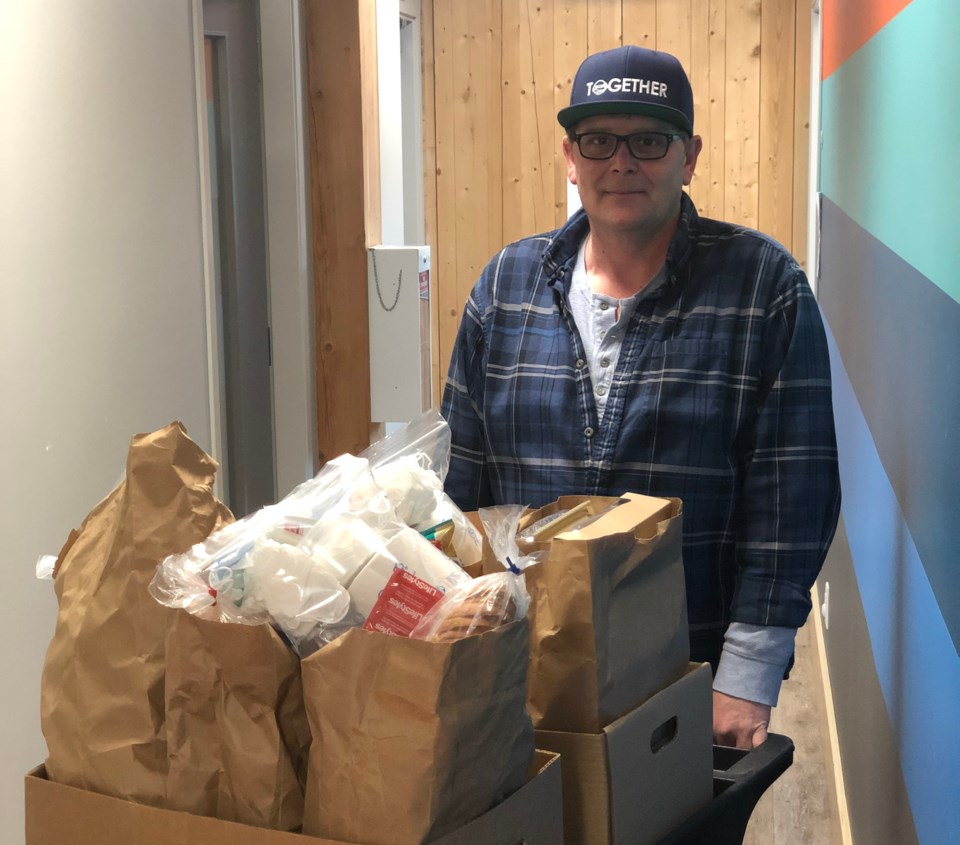Fraser Carey gets a lot of pleasantly surprised looks in his role as food security coordinator for the Whistler Community Services Society (WCSS).
Whether it’s the gracious clients who walk into the food bank looking for a hand and walk away with the ingredients and recipe to whip up a delectable, gourmet meal, or the cooped-up locals in COVID-19 quarantine he personally delivers a meal kit to, Carey is helping shift the perception of what a food bank does.
“That’s my mandated goal this year, to try to remove the stigma or the preconceived notion of what a food bank is,” he said.
“Food security is such an issue that I think it needed to be addressed and I think it needs to be addressed from all areas. From businesses, hotels, restaurants, grocery stores, farms. We need to feed the people. We need to get people with food in their stomachs. That fuels their next move.”
First coming on in November of last year, Carey, the former manager of the Fairmont Chateau Whistler’s Portobello restaurant, left a job teaching culinary arts at the local Tamwood International College before the pandemic left him without work. Given his and the Fairmont’s involvement in WCSS’ hot-lunch school program over the years, Carey felt the transition into a non-profit role was a natural fit.
“I found that I wanted to keep going and I wanted to keep sharing what I knew,” Carey said. “It’s rewarding for me. I leave my job and I feel good, especially now because I see that the impact of what I do changes somebody—and not only just because I’m feeding them, but also their mental state. That’s one less thing on their plate that they have to worry about this week.”
Food banks have long been thought of as a last-resort option for only the most vulnerable members of society, serving flavourless canned goods and day-old bread. But the reality is that food-bank clientele is incredibly diverse, particularly in Whistler, where the pandemic has only exacerbated the financial pressures that exist here.
“The misconception that you have to be homeless and indigent to use a food bank is so untrue,” Carey said. “In most metropolitan cities and Whistler, rents are so out there that more than half of somebody’s income goes towards their rent. If you have a car and you have insurance, there’s another 30 per cent.”
Along with getting wholesale pricing on food purchases, WCSS also sources large volumes of food from local restaurants, hotels and grocery stores that would otherwise be discarded—to the tune of 5,000 pounds last month alone.
“It’s produce, it’s bakery items, it’s bread, it’s all these items where there may be a case of eggs that has come in, but because the first few have broken and leaked over the rest of them, the grocery stores can’t sell them. So we can repackage those eggs and redistribute them,” Carey said.
Pre-pandemic, the food bank utilized a self-shop model where clients could pick their own items off the shelves. With health protocols in place, WCSS has had to move to pre-packaged meal kits, and the organization has started posting regular recipes online that can be made from the ingredients sent home with clients, including a sweet potato and kale fry-up, green bean casserole and banana bread.
“I think it brings a sense of, ‘Oh, there actually is food at the food bank,’” Carey said of the recipes.
“We have seen people be more accepting that they’re using the food bank and thanking us for being out in our community and trying to take away that stereotype.”
You can also find Carey decked out in full PPE as he has delivered meal kits to locals in COVID-19 isolation or quarantine, another way WCSS is challenging perceptions around food banks.
“I don’t actually see them until I’m at least six feet [two metres] away from their door, and it’s usually that big thank you, like, ‘Oh my god, this is amazing. I can’t believe you guys do this!’” he relayed.
This month also saw the launch of a new WCSS program spearheaded by Carey called Kids Can Cook, free cooking classes (although families can choose to pay to help cover the cost of the program for another local family) that teach youngsters basic kitchen skills.
“One of the reasons I brought this project forward was, as a kid myself, I would finish school and go home and my parents were both working and I wanted to contribute to my family so I started thinking outside the box of what I could do. I saw how working with your child after work to make the meal and have the meal ready for your family when they come home, it helps boost how the child sees themselves and their self-confidence,” he said.




